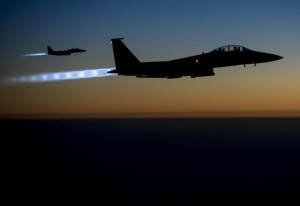
U.S.-led coalition bomb ISIS oil sites in Syria for 2nd straight day
The U.S.-led coalition that has been attacking Islamic State militants got some serious firepower Friday when Britain, Belgium and Denmark announced they were joining the fight.
British Prime Minister David Cameron got the green light to sic warplanes on ISIS positions in Iraq after reminding reluctant lawmakers that the militants have been beheading victims and carrying out crucifixions to promote goals “from the Dark Ages.”
“This is about psychopathic terrorists that are trying to kill us and we do have to realize that, whether we like it or not, they have already declared war on us,” he said. “There isn’t a ‘walk on by’ option. There isn’t an option of just hoping this will go away.”
The reinforcements are coming just in time. Gilles de Kerchove, the European Union’s anti-terrorism chief, told the BBC some 3,000 jihadists from Europe have joined ISIS, “which is unprecedented.”
The Brits, who supported the 2003 invasion that toppled Saddam Hussein, had been wary of being dragged into another disastrous Iraq war.
Cameron assured them the campaign President Obama has been leading would be about “patience and persistence, not shock and awe” — the term the Bush Administration used to describe their attack on Iraq.
The British resolution is limited to fighting in Iraq and does not address attacking Syria, which the coalition has been bombing for four days.
No European country has agreed yet to attack ISIS in Syria, where a civil war has been raging between forces loyal to brutal dictator Bashar Assad and rebels trying to out him.
The Royal Air Force is expected to deploy Tornado jet fighters, including some based in Cyrus that are already within striking distance of Iraq. They are armed with Dual Mode Brimstone missiles that are especially adept at hitting ISIS convoys.
The Belgians also set aside their qualms and voted overwhelmingly to join the aerial assaults on Iraq. In May, a former ISIS fighter killed four people at the Jewish Museum in Brussels.
“We must fight against torture, against decapitations, so it’s time to act,” Belgian lawmaker Veli Yuksel said.
Danish Prime Minister Helle Thorning-Schmidt said her government would send four operational planes and three reserve jets along with 250 pilots.
“No one should be ducking in this case” she said. “Everyone should contribute.”
Poland was one of the few European countries that contributed soldiers and actively fought insurgents during the Iraq War. But so far the Poles have only offered symbolic support for the fight against ISIS because they have a bigger worry on their border — Russia and the chaos in Ukraine.
The Brits, Belgians and Danes signed on as coalition warplanes once again bombed ISIS-controlled oil installations in eastern Syria.
For a second straight day, U.S. and Arab country jets took aim at what it the biggest source of ISIS money — black market oil that brings in about $2 million a day.
The British-based Syrian Observatory for Human Rights said the strikes overnight and early Friday hit the Tink oil field as well as the Qouriyeh oil-producing area in Deir el-Zour.
U.S. warplanes also attacked the ISIS headquarters in the town of Mayadeen and militant positions around the border city of Al-Hasakah, according the Observatory, which relies on a network of activists on the ground for its information.
Obama ordered air strikes against ISIS in Iraq last month to stop the Islamic fanatics, who had already conquered large swaths of Iraqi and Syrian territory, from wiping out ethnic minorities.
Six weeks of U.S. bomb attacks stymied what had been a relentless ISIS advance. And on Tuesday, Obama opened a new front in Syria, this time with a coalition that includes several Arab nations.
The bombings appear to be having the desired effect on ISIS.
Activists say the militants have stopped manning some checkpoints and civilians are fleeing areas that ISIS controls.
READ THE FULL ARTICLE HERE.
SOURCE: Daily News
BY: Corky Siemaszko




